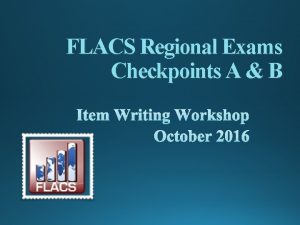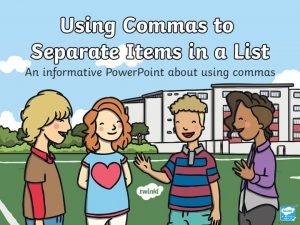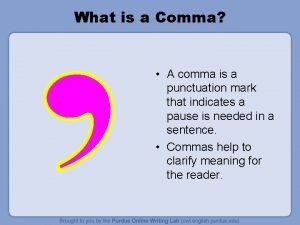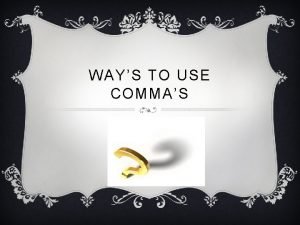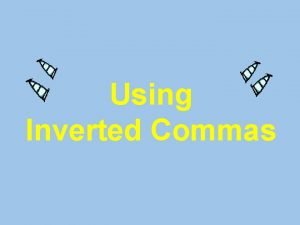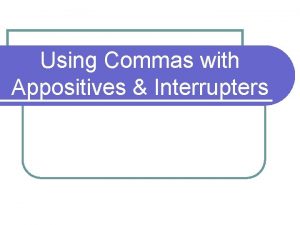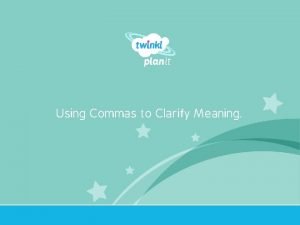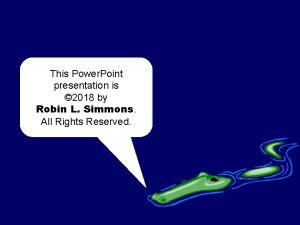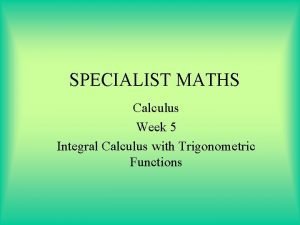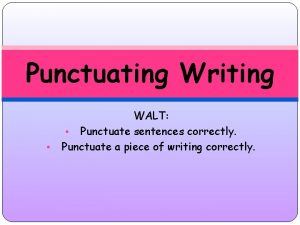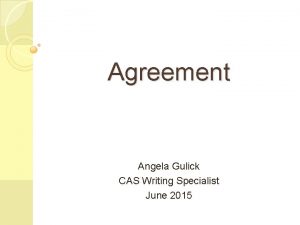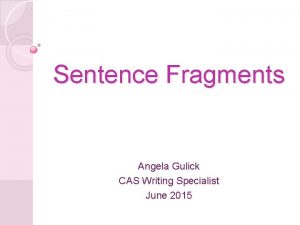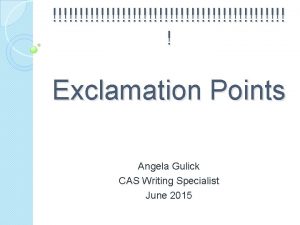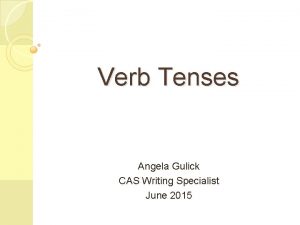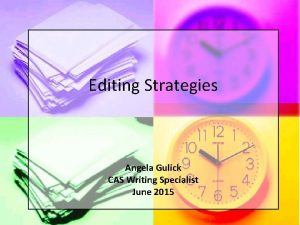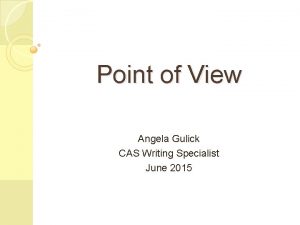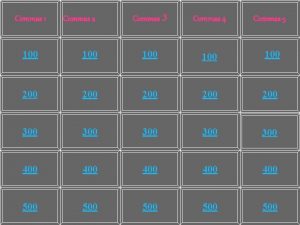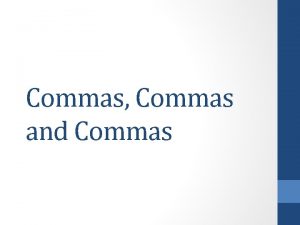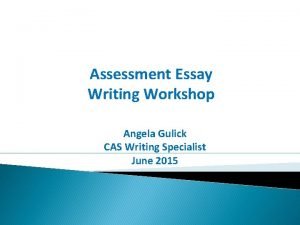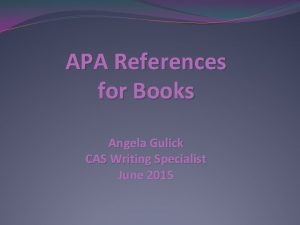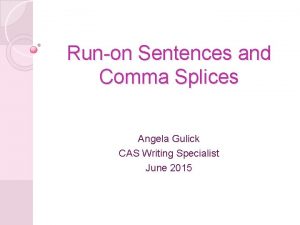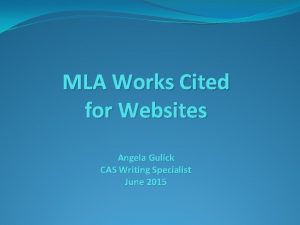Commas Angela Gulick CAS Writing Specialist June 2015















- Slides: 15

, , , , , , , , , , , , , Commas Angela Gulick CAS Writing Specialist June 2015

Commas , , , , , , , , , , , , , Commas have many different uses, but this workshop will focus on the main six uses. Please note: Often, writers want to use a comma for any pause that occurs within a sentence. Or, writers have been told to put in commas whenever writers “breathe. ” Or, my favorite, writers get nervous and just start sprinkling in commas at random. It is better to learn the following rules. Don’t use a comma unless you can specifically justify its existence.


Commas , , , , , , , , , , , , , Use 1: Commas and Coordinating Conjunctions If you have two complete sentences that are divided by a coordinating conjunction (for, and, nor, but, or, yet, so = fanboys), you need a comma. If you don’t have two complete sentences, you don’t need the comma. Here are two examples: My brother Chris and his wife Yukiko live in Guam, and they own their own diving company. >>>>>In this case, a comma is needed because what follows the coordinating conjunction “and” is a complete sentence: they own their own diving company. My brother Chris and his wife Yukiko live in Guam and own their own diving company. >>>>>In this case, a comma is not needed because what follows the coordinating conjunction “and” is not a complete sentence: own their own diving company.

Commas , , , , , , , , , , , , , Here is another example: I love going out with my friends on New Year’s eve, but I always end up eating too much food. >>>>>In this case, a comma is needed because what follows the coordinating conjunction “but” is a complete sentence: I always end up eating too much food. Oh, am I I love going out with my friends on New Year’s eve but always going to end up eating too much food. regret eating all of this In this case, a comma is not needed because tomorrow… what follows the coordinating conjunction “but” is not a complete sentence: always end up eating too much food. Copyright Angela Gulick, January 2012

Commas , , , , , , , , , , , , , And one final example: Do you want to go to see Mission Impossible: Ghost Protocol, or would you rather see Hugo tomorrow afternoon? >>>>>In this case, a comma is needed because what follows the coordinating conjunction “or” is a complete sentence. This time, the sentence is a question: would you rather see Hugo tomorrow afternoon? Do you want to go to see Mission Impossible: Ghost Protocol or Hugo tomorrow afternoon? >>>>>In this case, a comma is not needed because what follows the coordinating conjunction “or” is not a complete sentence: Hugo tomorrow afternoon?

Commas , , , , , , , , , , , , , Use 2: Commas and Introductory Words, Phrases, and Clauses Often, writers lead in to their main sentences with information before the subject of the sentence is presented. This information can be is a single word or a grouping of words. Here is a good rule of thumb: If you lead into your main sentence with 5 words or more, put a comma between the introduction and subject of your sentence. Here are some examples: Last night on The Daily Show, Jon Stewart interviewed the Speaker of the House Nancy Pelosi. When my mother makes a cake, she lets my little sister lick the wooden spoon so she won’t start crying. After watching really scary movies, I find it hard to fall asleep at night because I hear strange sounds in my house. On her way home yesterday, Christina saw a rainbow up in the sky.

Commas , , , , , , , , , , , , , Use 3: Commas and Series of Words or Phrases Probably one of the most well known comma rules is the “rule of three. ” If you write a sentence where you have three or more items in a series, you use commas in between the items and the final “and. ” Note that this rule applies to words and phrases. Here are some examples: A series of three involving words: When I go out to Target after work, I need to remember to pick up shampoo, conditioner, and cough drops. A series of three involving phrases: Over winter break, I got to spend time with my family, listen to a bunch of Beatles songs, and watch old episodes of The Simpsons. Did you know… The comma that comes before the final “and” in your series is called the Oxford comma? Maybe one day, you’ll be on Jeopardy, and that will be the big question at the end for all the money. You’re welcome .

Commas , , , , , , , , , , , , , Use 4: Commas and Dependent Clauses That Come before Independent Clauses An independent clause is merely a complete sentence. If you read the sentence out loud, it sounds complete. A dependent clause cannot stand on its own and be meaningful. It needs to be connected to a complete sentence. This connection can be at the beginning, in the middle, or at the end of the sentence. Here are some examples: If you aren’t here by noon, we’ll have to leave for the ice rink without you. >>>>>The first part, “If you aren’t here by noon” is a dependent clause. This is not a complete thought. If you aren’t hear by noon…WHAT? Because the dependent clause comes before the independent clause, you need to insert a comma. We will, if you aren’t here by noon, have to leave for the ice rink without you. >>>>>In this example, the dependent clause is put into the middle of the independent clause. Note the use of commas to separate the dependent from independent clause. We will have to leave for the ice rink without you if you aren’t here by noon. >>>>>In this example, the independent clause comes first and then is followed by the dependent clause. However, since the independent clause comes first, you do not need to use a comma.

Commas , , , , , , , , , , , , , Here is another example: In this example, the dependent clause (because she is very athletic) can appear at the beginning, in the middle, or at the end of the sentence. Notice where the commas go in each case. Because she is very athletic, Sara’s favorite activity is soccer. >>>>>A comma is needed after the dependent clause. Sara’s favorite activity, because she is very athletic, is soccer. >>>>>Commas are need on each side of the dependent clause. Sara’s favorite activity is soccer because she is very athletic. >>>>>No comma is needed between the independent clause and the dependent clause.

Commas , , , , , , , , , , , , , Here are the most common words that indicate dependant clauses: after although as as soon as because before by the time even if even though every time if in case in the event that just in case now that once only if since the first time though unless until whenever whereas whether or not while

Commas , , , , , , , , , , , , , Use 5: Commas that introduce direct quotations You need to note these rules to determine if you need a comma with a direct quotation. When to use a comma: Use a comma when you introduce a quotation by using the author's name and an action verb and if the quotation is a complete sentence. Here are some sample action verbs: suggests, writes, states, says, comments. >>>>>Harold Jorgensen writes, “The one word that was completely overused by the end of last season’s Project Runway was fierce. ” When not to use a comma: If you put “that” in front of your quotation, you omit the comma and lowercase the first word of the quotation unless that word is a proper noun. >>>>>Harold Jorgensen writes that the “one word that was completely overused by the end of last season’s Project Runway was fierce. ”

Commas , , , , , , , , , , , , , Use 6: Commas That Prevent Confusing Sentences. Sometimes, you need to use a comma to prevent confusing your reader. Consider this sentence: After shedding snakes look for something to eat. There are two ways to interpret the meaning of this sentence: After shedding snakes [you should] look for something to eat. >>>>>As people don’t shed snakes (other than maybe Medusa), this interpretation is just creepy. After shedding, snakes look for something to eat. >>>>>After snakes shed their skins, they then look for something to eat. Let’s hope this is the meaning the author intended.

A Final Thought about Commas , , , , , , , , , , , , , Of all punctuation points, commas seem to give writers the most trouble because there are so many different uses for commas. Again, try to explain to yourself why you want to use a comma. Doing so will help you, over time, learn the rules so you can make these punctuation decisions more easily. If you can’t come up with a specific reason for using a comma, omit the comma.

Do You Still Have Questions? If you still have questions, please stop by the Writing Lab (D 120) or check out our list of writing workshops on the CAS Resources page. Here additional websites that can help you with grammar, punctuation, and mechanics issues. The first two links with ’s also have online exercises with answer keys to help you practice. Grammar Bytes Note: This site might require you to download a small program onto your computer the first time you use it. Guide to Grammar and Writing Purdue Online Writing Lab (OWL) Grammar Girl The Blue Book of Grammar
 June 2015 flacs exam answers
June 2015 flacs exam answers Commas in dates
Commas in dates Non specialist audience
Non specialist audience What are commas used for
What are commas used for Commas to separate adjectives
Commas to separate adjectives Using commas in a list
Using commas in a list When to put inverted commas
When to put inverted commas These are used as interrupters for appositives
These are used as interrupters for appositives In fact commas
In fact commas What are commas used for
What are commas used for Commas with and
Commas with and Math specialist formula sheet
Math specialist formula sheet Seo punto rojo
Seo punto rojo Prm specialist
Prm specialist 5 example of relative pronoun
5 example of relative pronoun Does a command have an exclamation mark
Does a command have an exclamation mark
